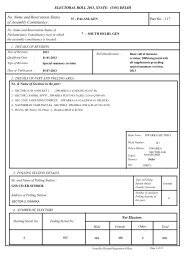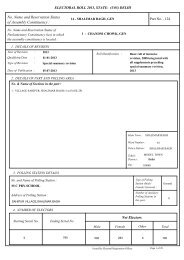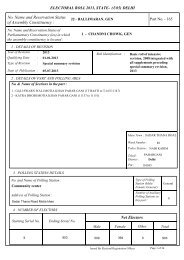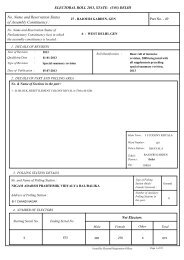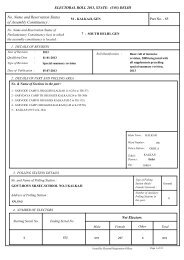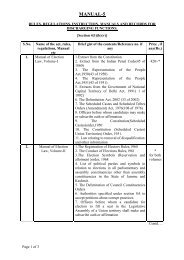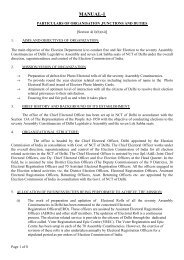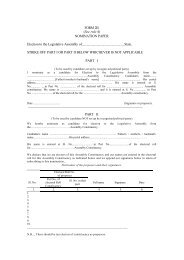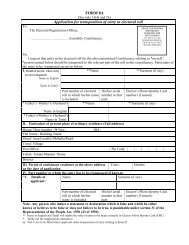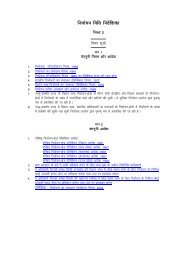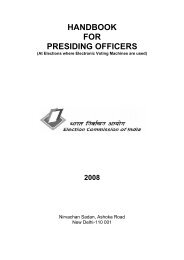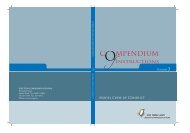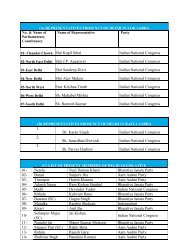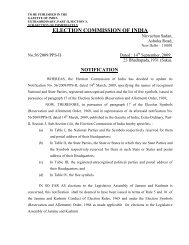Handbook for Electoral Registration Officers - Election Commission ...
Handbook for Electoral Registration Officers - Election Commission ...
Handbook for Electoral Registration Officers - Election Commission ...
- No tags were found...
Create successful ePaper yourself
Turn your PDF publications into a flip-book with our unique Google optimized e-Paper software.
31. The ERO immediately on receipt of an application <strong>for</strong> deletion of an entry excepton the ground that a person is dead, should paste one copy thereof in the notice board ofhis office together with a notice inviting objections, if any, to the deletion of the namewithin period of 7 days from the date of such posting. A notice should also be servedupon the person concerned and also to the person presenting the application <strong>for</strong> deletionmentioning the date on which the application will be heard. The publication of the noticeshould not be postponed to the next working day except in unavoidable circumstances. Incalculating the notice period of 7 days the date of publication of the notice should beexcluded and if last date so calculated falls on a Sunday or other public holiday, the nextworking day should be specified as the last day <strong>for</strong> making objections, if any. No specific<strong>for</strong>m is prescribed <strong>for</strong> making such objection in response to the above notice. The EROshould simultaneously take steps <strong>for</strong> verification. He should conduct a summary enquiryafter the expiry of the period of notice and thereafter pass appropriate orders.32. In case an application is made <strong>for</strong> the deletion of a name on the ground that theperson concerned is dead, enquiries shall be conducted to verify the fact of death.Thereafter action should be taken to delete the name.33. The same procedure should be followed in the case of applications made <strong>for</strong>correction of entries or transposition of entries. In dealing with applications <strong>for</strong>transposition of entry from the last part containing names of service voters to the partcontaining the general voters the ERO should satisfy himself with reference to theoriginal discharge certificate and also that the person is otherwise qualified.Communication to the Effected Persons34. In every case where applications under Section 22 or 23 are allowed, that factshould be communicated to the applicant and no copy of the order need be supplied tohim. But in every case, the ERO must briefly record his reasons in the order to be kept inhis official records. An uncertified copy of the order should be supplied free to the personobjected to (whose name has been deleted by allowing the objection) so that he may filean appeal, if he so desires. In case an application is rejected, the ERO should record hisreasons and an uncertified copy of the order should be supplied to the applicant free ofcost so as to enable him to file an appeal. Certified copies of orders should be suppliedonly on payment and only when applied <strong>for</strong>.Appeal35. An appeal against the order of the ERO rejecting or allowing an application underSection 22 or Section 23 lies under Section 24 to the CEO within 15 days from the dateof such order. The appeal should be in the <strong>for</strong>m of a memorandum signed by theappellant and accompanied by a copy of the order appealed from and fee of Rs.5 (Rule27). This fee should be paid either by means of non-judicial stamp or deposited in aGovernment Treasury or the Reserve Bank in favor of CEO. Fee can also be paid in suchother manner as may be directed by the <strong>Election</strong> <strong>Commission</strong>. The <strong>Commission</strong> hasdirected that the above fee can also be paid in cash to the CEO. The appellant should69



